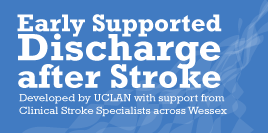 |
Dysphagia |
Recommendations 6.21.1
A. Until a safe swallowing method has been established, all patients with identified swallowing difficulties should:
- be considered for alternative fluids with immediate effect
- have a comprehensive assessment of their swallowing function undertaken by a specialist in dysphagia
- be considered for nasogastric tube feeding within 24 hours
- be referred for specialist nutritional assessment, advice and monitoring
- receive adequate hydration, nutrition and medication by alternative means
- be considered for the additional use of a nasal bridle if the nasogastric tube needs frequent replacement, using locally agreed protocols
B. Any stroke patient unable to swallow food safely one week after stroke should be considered for an oro-pharyngeal swallowing rehabilitation programme designed and monitored by a specialist in dysphagia. This should include one or more of:
- compensatory strategies such as postural changes (eg chin tuck) or different swallowing
- manoeuvres (eg supraglottic swallow)
- restorative strategies to improve oro-pharyngeal motor function (eg Shaker head lifting exercises)
- sensory modification, such as altering taste and temperature of foods or carbonation of fluids
- texture modification of solids and/or liquids
C. Every stroke patient who requires food or fluid of a modified consistency should:
- be referred for specialist nutritional assessment
- have texture of modified food or liquids prescribed using nationally agreed descriptors
- have both fluid balance and nutritional intake monitored
D. Stroke patients with difficulties self-feeding should be assessed and provided with the appropriate equipment and assistance (including physical help and verbal encouragement) to promote independent and safe feeding as far as possible
E. All stroke patients with swallowing problems should have written guidance for all staff/carers to use when feeding or providing liquid
F. Nutrition support should be initiated for people with stroke who are at risk of malnutrition which should incorporate specialist dietary advice and may include oral nutritional supplements, and/or tube feeding
G. Instrumental direct investigation of oropharyngeal swallowing mechanisms (eg by videofluoroscopy or flexible endoscopic evaluation of swallowing) for stroke patients should only be undertaken:
- in conjunction with a specialist in dysphagia
- if needed to direct an active treatment/rehabilitation technique for swallowing difficulties, or to investigate the nature and causes of aspiration
H. Gastrostomy feeding should be considered for stroke patients who:
- need but are unable to tolerate nasogastric tube feeding
- are unable to swallow adequate amounts of food and fluid orally by four weeks
- are at long-term high risk of malnutrition
I. Any stroke patient discharged from specialist care services with continuing problems with swallowing food or liquid safely should:
- be trained, or have carers trained, in the identification and management of swallowing difficulties
- should have regular reassessment of their dysphagia beyond the initial acute assessment to enable accurate diagnosis and management
- should have their nutritional status and dietary intake monitored regularly by a suitably trained professional
Sources 6.21.1
A. National Institute for Health and Clinical Excellence 2008b
B. Foley et al. 2008; Speyer et al. 2010
C. Carnaby et al. 2006; National Patient Safety Agency 2011; Royal College of Speech and Language Therapists and British Dietetic Association 2003
D. Consensus
E. Consensus
F. National Institute for Health and Clinical Excellence 2006a
G. Royal College of Speech and Language Therapists 2007; Royal College of Speech and Language Therapists 2008; Martino et al. 2005; Carnaby et al. 2006; consensus
H. National Institute for Health and Clinical Excellence 2006a; Dennis et al. 2005; Beavan et al. 2010
I. Consensus; Heckert et al. 2009; National Institute for Health and Clinical Excellence 2006a
 |